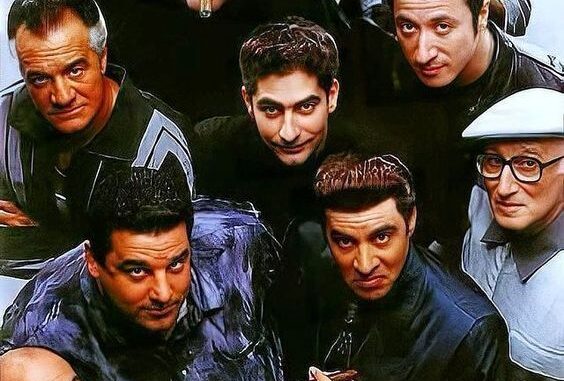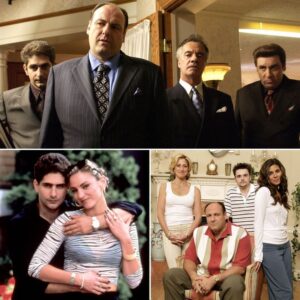
The Sopranos: Why Did Tony Kill Christopher? The Shocking Truth Behind a Controversial Moment
The Sopranos is full of shocking twists, heartbreaking betrayals, and complex moral decisions. However, one of the most chilling and pivotal moments in the series comes when Tony Soprano, the ruthless but oddly sympathetic mob boss, kills his own cousin and close confidant, Christopher Moltisanti. The murder takes place in the final moments of Season 6, Episode 6, titled “Kennedy and Heidi,” and it leaves viewers stunned, questioning why Tony would take such an extreme step. After all, throughout the series, Christopher had been like a son to him, even though their relationship was often fraught with tension and betrayal.
In this article, we will explore the psychological, narrative, and thematic reasons behind Tony’s decision to kill Christopher, examining the deep-seated emotions and events that led up to this tragic moment. Was it a calculated move, a moment of rage, or something else entirely? Let’s dive into the layers of meaning behind this shocking act.

The Context: Christopher’s Decline
To understand why Tony kills Christopher, it’s important to first recognize Christopher’s character arc and his eventual decline. Throughout the series, Christopher starts off as a young and ambitious mobster, eager to prove himself in the family business. He idolizes Tony and looks up to him as a father figure, frequently seeking his approval. However, as the series progresses, Christopher’s life begins to spiral out of control. His personal demons, including substance abuse, anger issues, and his troubled relationships, significantly hinder his potential and stability within the family.
Substance Abuse and Unreliability
Christopher’s ongoing battle with alcoholism and drug addiction is one of the primary reasons Tony begins to lose faith in him. In the earlier seasons, Christopher’s struggles with heroin addiction were a major source of tension between him and Tony. While Tony tried to offer guidance and assistance, it became increasingly clear that Christopher’s addiction was too entrenched. This not only made Christopher unreliable but also put the entire operation at risk, particularly in moments of crisis when Tony needed loyalty and clear-headedness.
In Season 5, when Christopher gets clean, there is a sense of hope that he might finally become the capable and dependable member of the family Tony always wanted. However, this hope is short-lived. His return to drinking and his decision to abandon his recovery in Season 6, when he gets into a car accident while under the influence, marks a turning point.
The accident results in Christopher’s near-death experience and leaves him severely injured, but this is also the moment when Tony realizes that Christopher’s emotional instability and addiction have rendered him a liability.
The Turning Point: Christopher’s Betrayal
Christopher’s betrayal of Tony in the later seasons becomes a key motivator for Tony’s decision to kill him. Throughout the series, the bond between Tony and Christopher is presented as a kind of surrogate father-son relationship. However, as the show progresses, the tension between them grows due to Christopher’s increasing recklessness and moments of personal betrayal.
The “Deal with the Devil” and the Hollywood Dream
One of the more symbolic betrayals happens when Christopher becomes enamored with the idea of becoming a screenwriter. In Season 5, he begins to distance himself from the Mafia world, focusing more on his Hollywood aspirations. He starts writing a screenplay, which he believes could be his ticket to fame and fortune. His desire for a different life—one outside the Mafia—signals a shift in his loyalty. While Tony tolerates his ambitions at first, it’s clear that Christopher’s dream of becoming a writer (and his increasing involvement in the entertainment world) creates a significant rift between them.
In one pivotal scene, Christopher talks about writing a script for a movie about his experiences in the Mafia. This is met with Tony’s frustration, as it signals a rejection of the mob life that Tony has dedicated himself to, despite the violence and danger. Tony sees Christopher’s Hollywood dreams as a betrayal of the family business that they’ve spent years building. Christopher’s involvement with Hollywood eventually begins to feel like a form of escape, a way for him to leave behind the criminal life and the constant danger that comes with it. This undermines the loyalty Tony values most in his inner circle.
Christopher’s Fatal Flaw: His Self-Destructive Nature
At the heart of Christopher’s downfall is his self-destructive nature. While Tony has always been a man of contradictions—ruthless yet sentimental, loving yet violent—Christopher is, to put it bluntly, a man who cannot get out of his own way. His insecurity, anger, and resentment often lead him to make decisions that not only hurt himself but those around him, especially Tony.
For example, in Season 6, Christopher’s behavior escalates to dangerous levels. His anger and jealousy over Tony’s success begin to cloud his judgment. He grows bitter, especially after the events surrounding his fiancée, Adriana La Cerva, and the pressures she faces due to her involvement with the FBI. Christopher’s inability to cope with his emotions and circumstances makes him increasingly erratic.
One of the most devastating moments for Tony is when Christopher inadvertently kills Adriana. After a tense argument and overwhelming pressure from the FBI, Adriana turns to Tony for help, but Christopher ends up killing her in a moment of rage—a crime Tony ultimately has to clean up. This is not just a betrayal of their friendship, but also of the values that Tony holds dear. Adriana was one of the few people Tony respected, and her murder is a significant breaking point in their relationship.
The Final Straw: The Death of Christopher
By the time we reach Season 6, Episode 6 (“Kennedy and Heidi”), Tony’s patience with Christopher has worn thin. While Christopher is still dealing with his addictions and the emotional fallout from his involvement in the death of Adriana, Tony can no longer overlook the damage he’s done. There are multiple layers to this final act of violence:
A Moment of Rage vs. Calculated Murder
The final straw comes when Tony and Christopher get into a car accident after an intense argument. Christopher, heavily intoxicated, veers off the road, and the crash leaves him critically injured. As he lies bleeding in the car, Christopher is completely vulnerable. Tony, at this point, is both exhausted and disgusted by him. In the past, Tony would have tried to save him, but now he sees Christopher as a liability—someone who has put both the operation and the family in danger too many times.
What follows is a moment that is chilling in its simplicity. Tony looks at Christopher, and in a moment of clarity, he decides to finish him off. As Christopher gasps for air, Tony deliberately cuts off his oxygen by suffocating him with a plastic bag. It is a cold, calculated decision, but one that Tony has likely been contemplating for some time.
The Psychological Reasoning Behind the Kill
Tony’s decision to kill Christopher can be understood as a combination of practical necessity and emotional exhaustion. On one hand, Christopher’s repeated drug use, violent outbursts, and lack of loyalty put Tony’s entire operation at risk. On the other hand, Tony’s decision is deeply personal. Christopher has become a constant reminder of Tony’s own failures—his inability to save those close to him from self-destruction. The final murder is a reflection of Tony’s sense of powerlessness—he can control everything in his mob empire, but he cannot save the people he loves from their own inner demons.
The Symbolic Implications: Tony’s Own Descent
The death of Christopher marks a turning point for Tony, both narratively and symbolically. It signals the ultimate loss of innocence in Tony’s life. Over the course of the series, Tony has been a man caught between two worlds: the Mafia and his family life. His relationship with Christopher was one of the few genuine emotional connections he had, and its destruction represents the collapse of what little personal stability Tony once had.
Moreover, Christopher’s death is a clear illustration of Tony’s inability to escape the Mafia lifestyle, even when it means cutting ties with his own flesh and blood. By killing Christopher, Tony seals his fate—he has become, for all intents and purposes, a man who has lost his humanity. He is not merely a mob boss; he is a predatory figure who will stop at nothing to maintain control.
Conclusion: The Tragic Complexity of Tony Soprano
Tony’s decision to kill Christopher is not just an act of violence; it is a moment of tragic complexity that encapsulates everything The Sopranos stands for. The show was never about good versus evil in the traditional sense—it was about the gray areas of life, and Tony’s actions reflect this moral ambiguity.
In killing Christopher, Tony becomes a man without hope, without redemption, and without the possibility of change. His decision to end the life of someone who was once like a son to him is the ultimate expression of how far Tony has fallen, both morally and emotionally.
In the end, Christopher’s death is a reflection of the show’s central themes: betrayal, self-destruction, and the inescapable consequences of a life of crime. It’s a decision that, while shocking, is ultimately the only one